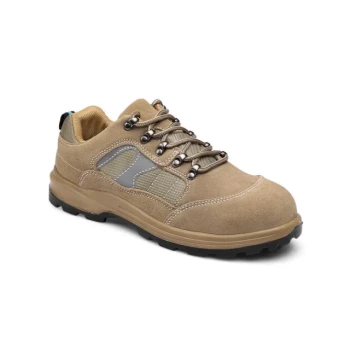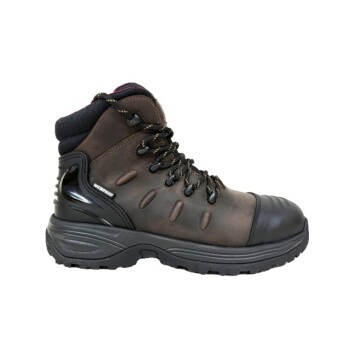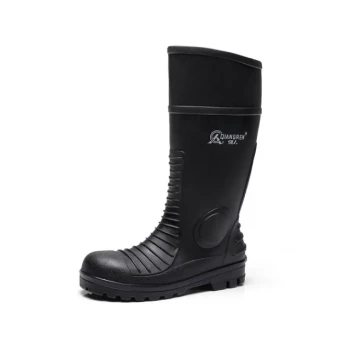Checking the certification on a pair of safety boots is the most critical step you can take before wearing them. It is the only way to guarantee that the footwear has been independently tested and proven to meet specific, legally-recognized safety standards like EN ISO 20345. Without this verification, you are relying on marketing claims rather than objective proof of protection.
Certification is not a feature; it is a fundamental guarantee. It transforms a boot from a simple piece of footwear into a validated piece of Personal Protective Equipment (PPE) that is legally compliant and proven to shield you from specific workplace hazards.
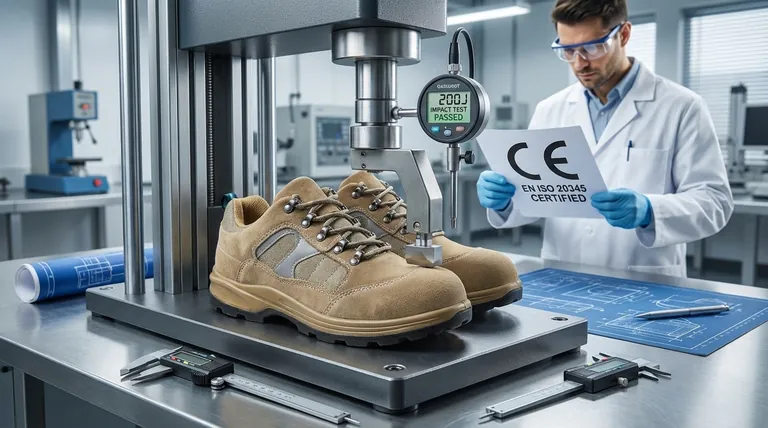
What Does Certification Actually Guarantee?
When you see a safety standard mark on a boot, it signifies that it has passed a series of non-negotiable tests performed by an accredited third-party laboratory. This process removes guesswork and provides a clear benchmark for performance.
A Universal Standard of Safety
Certification codes like EN ISO 20345 create a common language for safety performance across the globe. This allows employers and workers to objectively compare different products and know exactly what level of protection they are getting, regardless of the brand.
Independent and Rigorous Testing
Certified boots are not graded by their own manufacturer. They are sent to independent labs and subjected to intense mechanical tests that simulate real-world accidents. This ensures the results are unbiased and trustworthy.
Proven Protection Against Specific Hazards
The tests measure precise performance metrics. This includes the toe cap's ability to withstand 200 joules of impact (equivalent to a 20kg weight dropped from about one meter) and 15 kilonewtons of compression (about 1.5 tonnes of resting weight). Other tests verify puncture resistance, slip resistance, and more.
Decoding the Most Common Standards
The lettering and numbers on a safety boot's label provide a concise summary of its capabilities. Understanding these codes allows you to choose the right tool for the job.
The Global Benchmark: EN ISO 20345
This is the primary European and international standard for safety footwear. All boots meeting this standard must, at a minimum, have a protective toe cap.
The standard uses codes to denote increasing levels of protection. For example, "SB" (Safety Basic) means it has toe protection, while "S3" means it has toe protection, anti-static properties, a puncture-resistant midsole, and a water-resistant upper.
The CE Mark: Your Assurance of Compliance
The CE mark is not a quality mark, but a mandatory declaration by the manufacturer that the product meets all relevant EU health, safety, and environmental protection legislation. For safety boots, this means they conform to the PPE regulations, making them legal to supply within the European Economic Area.
The Critical Risks of Uncertified Footwear
Choosing boots without proper certification, or with fake labels, introduces significant and unnecessary risk to both the wearer and the employer.
A False Sense of Security
An uncertified boot may look the part, but it has not been proven to perform under stress. In an accident, it can fail catastrophically, offering little to no protection when you need it most.
Legal and Insurance Liability
For an employer, providing uncertified footwear is a serious breach of health and safety regulations. In the event of an injury, this can lead to severe legal penalties, invalidated insurance claims, and significant financial liability.
Inconsistent Quality and Materials
Without a standard to adhere to, manufacturers of non-certified boots can cut corners on materials and construction. This often results in footwear that degrades quickly and fails to provide even basic durability, let alone certified protection.
Making the Right Choice for Your Role
Verifying certification is a simple process that ensures you are getting the protection you are paying for. Use the information on the boot's tongue or inner lining to make an informed decision.
- If you are an employee: Your priority is personal safety. Look for the label inside the boot that clearly states the standard (e.g., EN ISO 20345), the protection category (e.g., S1P, S3), and the CE mark.
- If you are a safety manager or employer: Your responsibility is compliance and duty of care. Always demand a formal Declaration of Conformity from your supplier for any new footwear you procure.
- If you are purchasing for yourself: Be cautious of vague terms like "work boot" or "safety-rated." Insist on seeing the specific standard it is certified to, as this is the only reliable measure of its protective capability.
By prioritizing verified certification, you are making a definitive and non-negotiable commitment to your own safety and professional responsibility.
Summary Table:
| Key Aspect | Why It Matters |
|---|---|
| Independent Testing | Guarantees boots are tested by a third-party lab, not the manufacturer. |
| Proven Hazard Protection | Confirms toe caps withstand 200J impact and 15kN compression. |
| Legal Compliance (CE Mark) | Mandatory for PPE to be legally supplied in the European Economic Area. |
| Risk Mitigation | Prevents catastrophic failures, legal penalties, and insurance issues. |
Source certified safety boots with confidence. As a large-scale manufacturer, 3515 produces a comprehensive range of EN ISO 20345 certified footwear for distributors, brand owners, and bulk clients. Our production capabilities ensure every pair meets the highest standards for impact, compression, and puncture resistance. Protect your workforce and ensure compliance – contact our experts today for a formal Declaration of Conformity and a tailored solution.
Visual Guide
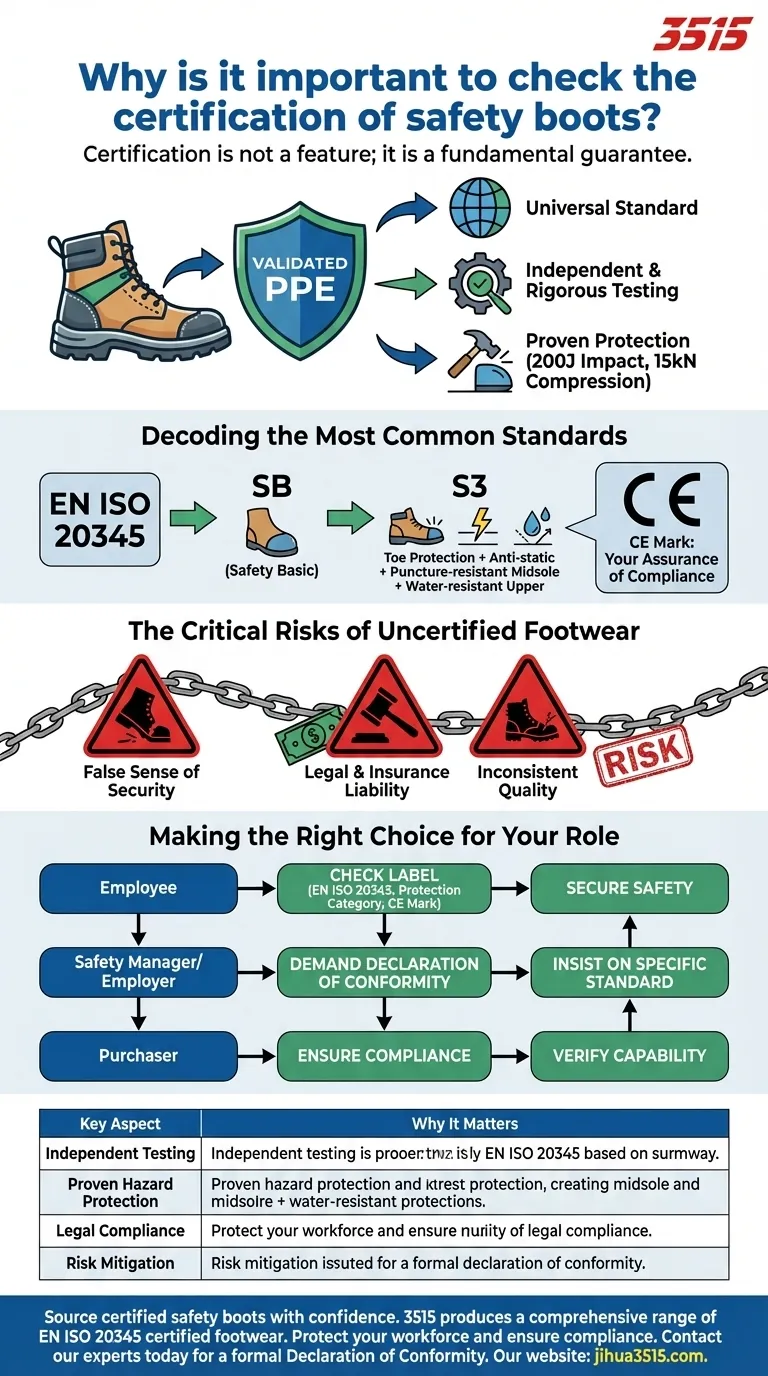
Related Products
- Wholesale Safety Boots Manufacturer for Custom & Private Label Orders
- High Performance Fire-Retardant Waterproof Safety Boots
- Premium Waterproof Nubuck Safety Boots for Wholesale
- Heavy-Duty Waterproof Nubuck Safety Boots Safety Shoes for Bulk Supply
- Durable Goodyear Welt Leather Work Boots for Wholesale & Private Label
People Also Ask
- What are the primary protective functions of industrial safety shoes? Shield Feet from Heavy Loads and Sharp Scraps
- What are the protective advantages of professional safety shoes? Crucial Safety for Fiber Extraction and Finishing
- What are safety shoes designed to protect against? A Complete Guide to Workplace Foot Protection
- What should you consider when choosing work or safety shoes? A Guide to Finding the Perfect Fit for Your Job
- What are the benefits of providing school shoes with safety-grade durability? Ensure Long-Lasting Social Impact
- What is Anti-Fatigue Technology in safety footwear? Reduce Strain for Workers on Their Feet
- What is the primary objective of utilizing dedicated safety shoes in nanomaterial work zones? Prevent Track-Out Now
- What role do high-precision foot scanning devices play in industrial safety footwear? Digital Precision for Safety
